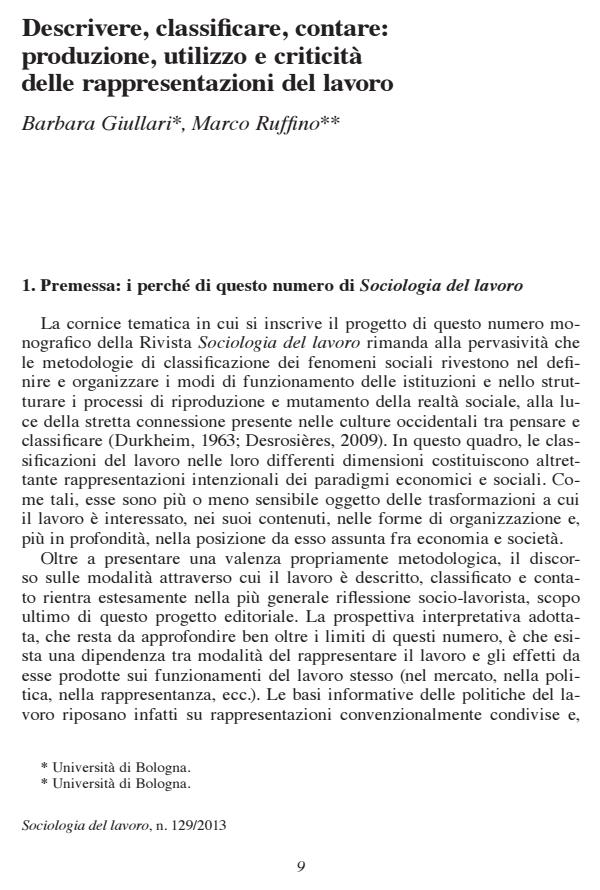Descrivere, classificare, contare: produzione, utilizzo e criticità delle rappresentazioni del lavoro
Titolo Rivista SOCIOLOGIA DEL LAVORO
Autori/Curatori Barbara Giullari, Marco Ruffino
Anno di pubblicazione 2013 Fascicolo 2013/129 Lingua Italiano
Numero pagine 13 P. 9-21 Dimensione file 265 KB
DOI 10.3280/SL2013-129002
Il DOI è il codice a barre della proprietà intellettuale: per saperne di più
clicca qui
Qui sotto puoi vedere in anteprima la prima pagina di questo articolo.
Se questo articolo ti interessa, lo puoi acquistare (e scaricare in formato pdf) seguendo le facili indicazioni per acquistare il download credit. Acquista Download Credits per scaricare questo Articolo in formato PDF

FrancoAngeli è membro della Publishers International Linking Association, Inc (PILA)associazione indipendente e non profit per facilitare (attraverso i servizi tecnologici implementati da CrossRef.org) l’accesso degli studiosi ai contenuti digitali nelle pubblicazioni professionali e scientifiche
Il paper risponde allo scopo di presentare il volume ed è diviso in due parti, precedute da una breve premessa generale. La prima parte richiama le ragioni per cui è importante riflettere sulle metodologie di classificazione del lavoro, avviando una prima riflessione che traccia il percorso sui cui si muovono i saggi raccolti nel volume, presentati nella seconda parte del contributo. Nella prospettiva interpretativa adottata le classificazioni del lavoro nelle loro differenti dimensioni costituiscono altrettante rappresentazioni dei paradigmi economici e sociali; inoltre si parte del presupposto che esista una dipendenza tra modalità del rappresentare il lavoro e gli effetti da esse prodotte sui funzionamenti del lavoro stesso (nel mercato, nella politica, nella rappresentanza, ecc.). In tale ottica ci si interroga sulle caratteristiche di trasparenza/opacità dei processi di produzione delle descrizioni e delle classificazioni del lavoro e sulla necessità di illustrarne lo stato dell’arte, evidenziare le risorse disponibili e l’evoluzione che le ha interessate. Un ulteriore tema affrontato riguarda il tentativo di aprire "la scatola nera" delle classificazioni, per offrire spunti di riflessione sulle criticità di efficacia della rappresentatività rispetto a specifici fattori di trasformazione negli attuali scenari sociali ed economici. Così come è importante ragionare del nesso fra rappresentazione (dei contenuti del lavoro) e rappresentanza (dei lavoratori). Conclude l’analisi una prima riflessione sulle conseguenze delle rappresentazioni dal punto di vista degli attori (collettivi ed individuali) che ad esse ricorrono, in termini di impatto sulle diseguaglianze, sull’attribuzione di responsabilità, sulla capacità di voice, sui processi democratici.;
Keywords:Classificazioni del lavoro, conoscenza pubblica, rappresentazioni, capacità di voice, spazio pubblico
- Bauman Z. (2002), La società individualizzata. Come cambia la nostra esperienza, Bologna: il Mulino
- Beck U. (2008), Conditio Humana. Il rischio nell’età globale, Roma-Bari: Laterza
- Boltanski L., Chiappello E. (1999), Le nouvel esprit du capitalism, Paris: Gallimard
- Borghi V. (2012), Sociologia e critica nel capitalismo reticolare. Risorse ed archivi per una proposta, in Rassegna Italiana di Sociologia, a. LIII, 3 DOI: 10.1423/38245
- Bourdieu P. (2004), Le strutture sociali dell’economia, Trieste: Asterios
- Bruner J. (1988), La mente a più dimensioni, Roma-Bari: Laterza
- Castel R. (1995), Les Métamorphose de la question social. Une chronique du salariat, Paris: Fayard
- de Leonardis O. (2009), Conoscenza e democrazia nelle scelte di giustizia: un’introduzione, in La Rivista delle Politiche sociali, 3
- Desrosières A. (2009), Stato, mercato e statistiche, in La Rivista delle Politiche sociali, 3
- Desrosières A. (2010) Est-il bon, est-il méchant? Le rôle du nombre dans le gouvernement de la cité néolibérale, Comunicazione al Seminario L’Informazione prima dell’informazione. Conoscenza e scelte pubbliche, Università di Milano Bicocca, 27 maggio 2010
- Douglas M. (1990), Come pensano le istituzioni, Bologna: il Mulino
- Dubet F. (2009), Le travail des sociétés, Paris: Seuil
- Durkheim E. (1963), Le forme elementari della vita religiosa, Torino: Edizioni di Comunità, ed. or. 1912
- Foucault M. (1971), L’ordre du discours, Paris: Gallimard
- Honneth A. (2004), Organized Self-Realization: Some Paradox of Individualization, in European Journal of Social Theory, 7, p. 463
- Lave J., Wenger E. (1991), Situated learning: Legitimate Peripheral Participation, Cambridge, Cambridge University Press
- March J., Olsen J. (1992), Riscoprire le istituzioni. Le basi organizzative
- Maruani M., Meron M. (2012), L’occupazione e le donne, le cifre che smentiscono i clichè, in Le Monde Diplomatique, dic.
- Oecd (2000), Knowledge Management in the Learning Society, Paris: OECD
- Orr J. (1995), Condividere le conoscenze, celebrare l’identità: la memoria di comunità in una cultura di servizio, in Pontecorvo C., Ajello A.M., Zucchermaglio C., a cura di, I contesti sociali dell’apprendimento. Acquisire conoscenze a scuola, nel lavoro, nella vita quotidiana, Roma: LED
- Rullani E. (2004), Economia della conoscenza, Roma: Carocci
- Sen A. (2009), The Idea of Justice, London: Allen Lane
- Sennett R. (2008), The craftman, London: Yale Univesity Press
- Supiot A. (2010), L’esprit de Philadelphie. La justice sociale face au marché total, Seuil: Paris
- Sicurezza, lavoro e giustizia sociale: trasformazioni in corso Vando Borghi, in SOCIOLOGIA DEL LAVORO 130/2013 pp.7
DOI: 10.3280/SL2013-130001 - Potenzialità e criticità di un'esperienza locale di creazione e utilizzo di strumenti di analisi delle traiettorie scolastiche e delle transizioni al lavoro alla luce del capability approach Barbara Giullari, in SOCIOLOGIA DEL LAVORO 141/2016 pp.107
DOI: 10.3280/SL2016-141007 - La costruzione organizzativa della sicurezza: il ruolo della formazione Barbara Giullari, in SOCIOLOGIA DEL LAVORO 130/2013 pp.172
DOI: 10.3280/SL2013-130011
Barbara Giullari, Marco Ruffino, Descrivere, classificare, contare: produzione, utilizzo e criticità delle rappresentazioni del lavoro in "SOCIOLOGIA DEL LAVORO " 129/2013, pp 9-21, DOI: 10.3280/SL2013-129002